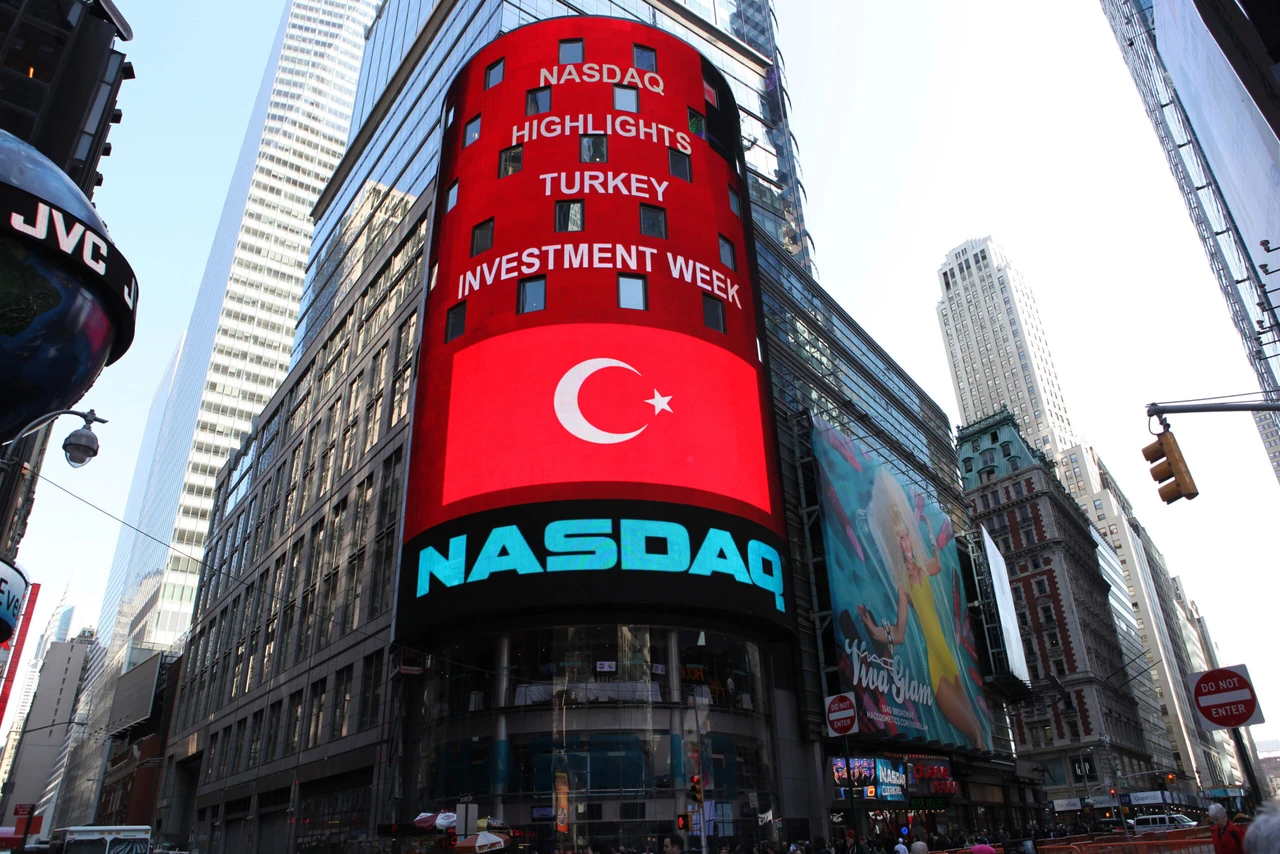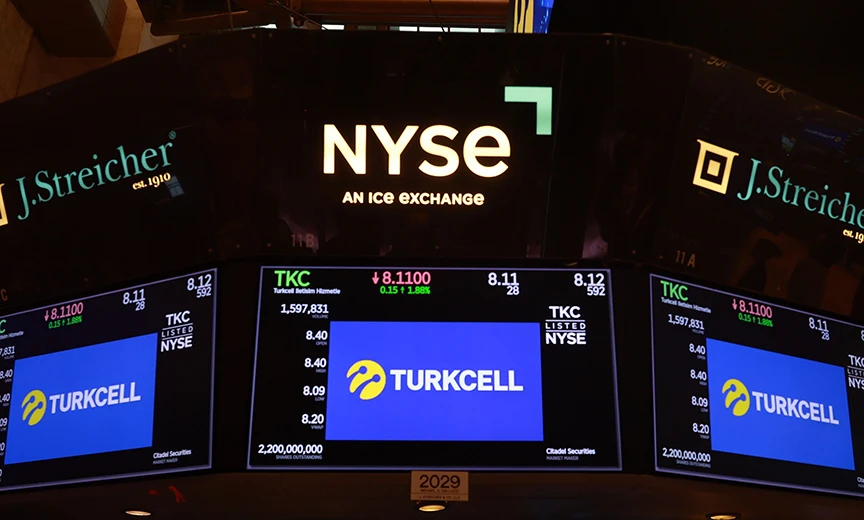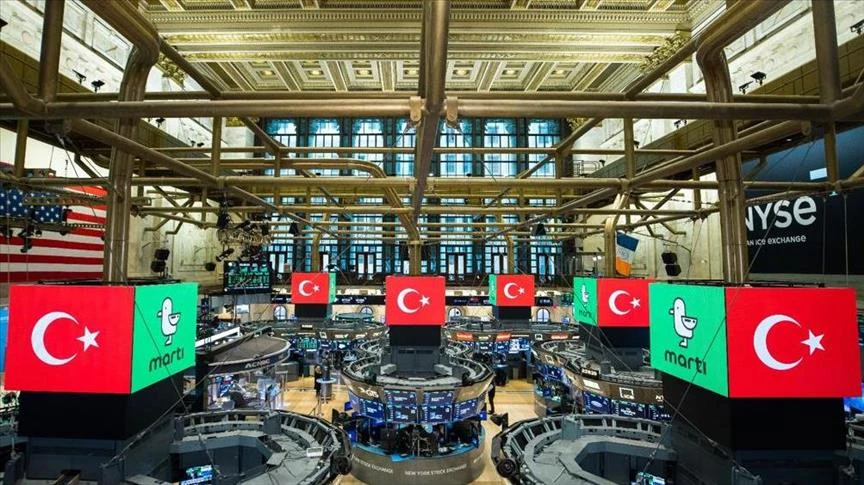Turkish Nasdaq stocks beat the market despite Q1 losses
 Nasdaq’s large digital billboard in Times Square displays a promotional message for Türkiye Investment Week in New York, U.S, on April 21, 2014. (AA Photo)
Nasdaq’s large digital billboard in Times Square displays a promotional message for Türkiye Investment Week in New York, U.S, on April 21, 2014. (AA Photo)
Turkish stocks listed on Nasdaq began 2025 with early gains but ended the first quarter in negative territory, weighed down by broad market challenges and recent political developments in Türkiye.
However, despite their sluggish performance, Turkish stocks continued to outperform the market, as the Nasdaq Composite Index (^IXIC)—which includes more than 3,000 stocks listed on the market—has declined by 10.42% since the beginning of the year.
In the first three months of the year, Türkiye’s largest telecommunications provider, the state-owned Turkcell (TKC), saw its shares decline by 6.89%. E-commerce platform Hepsiburada (HEPS) posted a sharper loss of 9.81%, while Marti (MRT), a transportation services startup, also fell by 6.85%.
The performance of these companies offers insight into investor sentiment toward Turkish firms amid renewed interest in emerging market assets, coinciding with growing concerns about a potential U.S. recession partly fueled by the return of Trump-era tariffs.
Turkcell: A state-owned giant

About the company: Turkcell, the largest Nasdaq-listed Turkish company, is Türkiye’s leading telecommunications and digital services provider, offering mobile, fixed broadband, and TV services to millions of customers across the country and in several international markets. Founded in 1994 and headquartered in Istanbul, the company has long been at the forefront of technological innovation in the region. It was the first in Türkiye to introduce GSM technology and has since become a pioneer in digital transformation through strategic investments in cloud computing, data centers, and AI-powered services.
Recent developments: Operating beyond Türkiye’s borders, Turkcell sold its Ukrainian subsidiaries in September 2024 to DVL Telecom, the telecom arm of France-based NJJ Holding, in a deal valued at $524.3 million. The subsidiaries operated Ukraine’s third-largest mobile network. The sale marked a strategic exit from a politically sensitive market, allowing the company to refocus its efforts and resources on core operations and expanding digital ventures. Turkcell currently maintains operations in two international markets: Belarus and the Turkish Republic of Northern Cyprus (TRNC).
Turkcell has also drawn attention due to speculation around a potential shift in its shareholder structure. According to a report published by Bloomberg in January, the Türkiye Wealth Fund (TWF), Turkcell’s largest shareholder, has expressed interest in acquiring the stake held by LetterOne—the investment firm owned by Russian billionaire Mikhail Fridman, who is currently the company’s second-largest stakeholder. The report also pointed to ongoing tensions between TWF and Fridman, particularly regarding disagreements over board appointments and broader governance issues.
In parallel with these developments, Turkcell successfully raised $1 billion through a dual-tranche Eurobond issuance, signaling strong investor confidence.
Financials: In 2024, the company’s total revenues grew by 7.8% year-over-year to ₺166.7 billion ($4.38 billion), while net profit reached ₺23.5 billion. The earing before interest, taxes, depreciation and amortization (EBITDA) margin stood at 41.9% on an annual basis.
For 2025, Turkcell aims for 7% to 9% real revenue growth and an EBITDA margin of 41% to 42%. The company projects its investment-to-revenue ratio will be around 24%.
Hepsiburada: $1B online retailer

About the company: Hepsiburada is one of Türkiye’s leading e-commerce platforms, often referred to as the “Amazon of Türkiye.” Founded in 2000 and headquartered in Istanbul, the company operates a marketplace model that connects millions of buyers with a wide range of sellers, offering products across electronics, fashion, home goods, personal care, and more. In addition to its marketplace, Hepsiburada provides value-added services such as logistics through its proprietary delivery network, payment solutions via its digital wallet Hepsipay, and advertising tools for merchants.
The company went public on Nasdaq in July 2021, becoming the first Turkish firm to do so in the e-commerce sector.
Recent developments: In September 2024, Kazakhstan-based Kaspi.kz agreed to acquire Hepsiburada’s 65.41% stake for $1.13 billion. The deal was finalized as Hepsiburada announced to Nasdaq on January 29 that the transfer of Class A and B shares—representing 65.4% of the company—to Kaspi.kz had been completed. Following the handover of the majority stake, Kaspi.kz’s CEO Mikheil Lomtadze has been appointed as the company’s first chairman.
As part of an ongoing restructuring, Hepsiburada’s subsidiary Hepsi Finansman completed its third bond issuance, selling ₺100 million in six-month bonds to domestic qualified investors at an annual interest rate of 43%, under a ₺1.05 billion program.
Financials: In 2023, Hepsiburada posted ₺35.55 billion in total revenue, with a ₺10.76 billion gross profit. Sales volume grew by 31% to ₺116.5 billion, and EBITDA reached ₺2.62 billion, raising its EBITDA-to-sales ratio to 0.4%.
The company has not yet announced its financial results for 2024. However, in the third quarter of 2024, its revenues stood at ₺12.24 billion, gross profit at ₺4.87 billion, and EBITDA at ₺1.86 billion.
Marti: New transportation service

About the company: Marti is a Turkish urban mobility company that operates a fleet of electric scooters, e-bikes, and ride-hailing services across major cities in Türkiye. Founded in 2018 and headquartered in Istanbul, Marti offers app-based transportation solutions aimed at reducing urban congestion and providing affordable alternatives for short-distance travel.
In addition to its core micromobility services, Marti has ventured into ride-hailing through its “Marti TAG” (Trip and Go) service, allowing users to share rides with registered drivers, similar to peer-to-peer models like Uber.
Marti went public on the New York-based Nasdaq stock exchange in 2023 through a SPAC merger, becoming the first Turkish mobility company to do so.
Recent developments: Marti currently struggles to ensure the legality of the ride-hailing model it serves through Marti TAG, which is featured as an alternative to taxis, sparking outrage among taxi businesses across the country. However, in January, a Turkish court ruled in favor of Marti TAG in a case, affirming the model’s legal standing.
While the company strives to expand its scooter and e-bike business, it also continues to pursue legal avenues to ensure the ride-hailing model’s compliance with Turkish law.
Marti’s ride-hailing service has reached 1.91 million riders and 290,000 registered drivers, surpassing its targets of 1.90 million riders and 290,000 drivers, the company reported.
Financials: In 2023, Marti reported $20.02 million in total revenues, with a negative gross profit of $4.57 million—making it the only Nasdaq-listed Turkish company operating with a negative balance.
While the company has not yet announced its financial results for 2024, Marti stated that it aims to reach positive free cash flow in 2025.
Critical factors to consider for Turkish Nasdaq stocks in second quarter
Although listed on the U.S. stock market, these Turkish companies conduct most of their operations in Türkiye, which makes them directly exposed to the country’s recent economic and political turmoil. The downturn was triggered by a high-profile corruption investigation targeting Istanbul Mayor Ekrem Imamoglu, which shook investor confidence.
As a result, the Turkish lira sharply depreciated, losing more than 12% of its value against the U.S. dollar on March 19, before the central bank stepped in with market interventions. Since then, the lira has recovered some ground, with losses narrowing to around 3% compared to pre-crisis levels. The exchange rate currently hovers near 37 lira per U.S. dollar.
This economic shock has heightened inflation concerns, with many investors fearing that the Turkish central bank may pause its recent cycle of interest rate cuts to stabilize prices. In March, the bank lowered its policy rate for the third consecutive month, bringing it down to 42.5%.
The central bank is set to announce its next monetary policy decision—including any changes to the policy rate—on April 17 at 2 p.m. local time (GMT+3).
Adding to the global market pressures, U.S. President Donald Trump’s newly implemented tariffs, which took effect on April 2, are expected to weigh on international trade. However, some analysts believe the tariffs could benefit emerging markets like Türkiye by leveling the competitive playing field. This view positions Turkish stocks as a potential opportunity, especially if the lira strengthens further under favorable trade dynamics.



